The Meritocracy Myth in Australian Education: A SOC102A Report
VerifiedAdded on 2022/09/11
|9
|2001
|39
Report
AI Summary
This report examines the meritocracy myth within the Australian education system, as outlined by McNamee and Miller. It argues that meritocracy is, in many ways, a myth, particularly in the context of Australian education. The report explores several 'non-merit' factors that can significantly influence a student's educational outcomes, including socioeconomic status, inherited advantages, and the influence of wealth on access to elite institutions. The research incorporates survey data and questionnaires to support the argument. The report highlights how these factors undermine the idea of equal opportunity and social mobility, ultimately leading to inequalities in the education system and the broader society. The conclusion emphasizes the need to address these non-merit factors to create a more equitable system. The report also touches upon the issues of hereditary advantages and the role of luck and good fortune in determining success within the meritocratic framework.
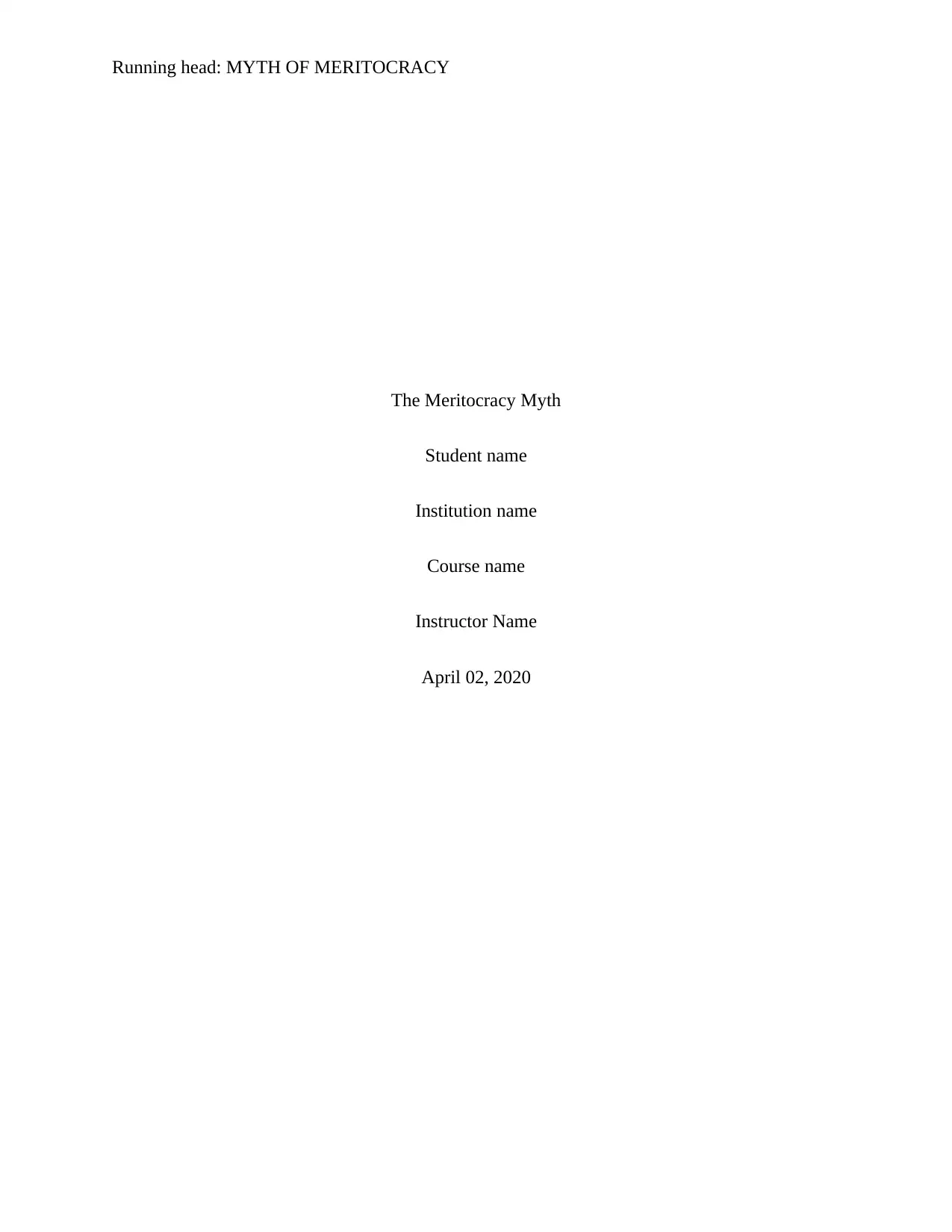
Running head: MYTH OF MERITOCRACY
The Meritocracy Myth
Student name
Institution name
Course name
Instructor Name
April 02, 2020
The Meritocracy Myth
Student name
Institution name
Course name
Instructor Name
April 02, 2020
Paraphrase This Document
Need a fresh take? Get an instant paraphrase of this document with our AI Paraphraser
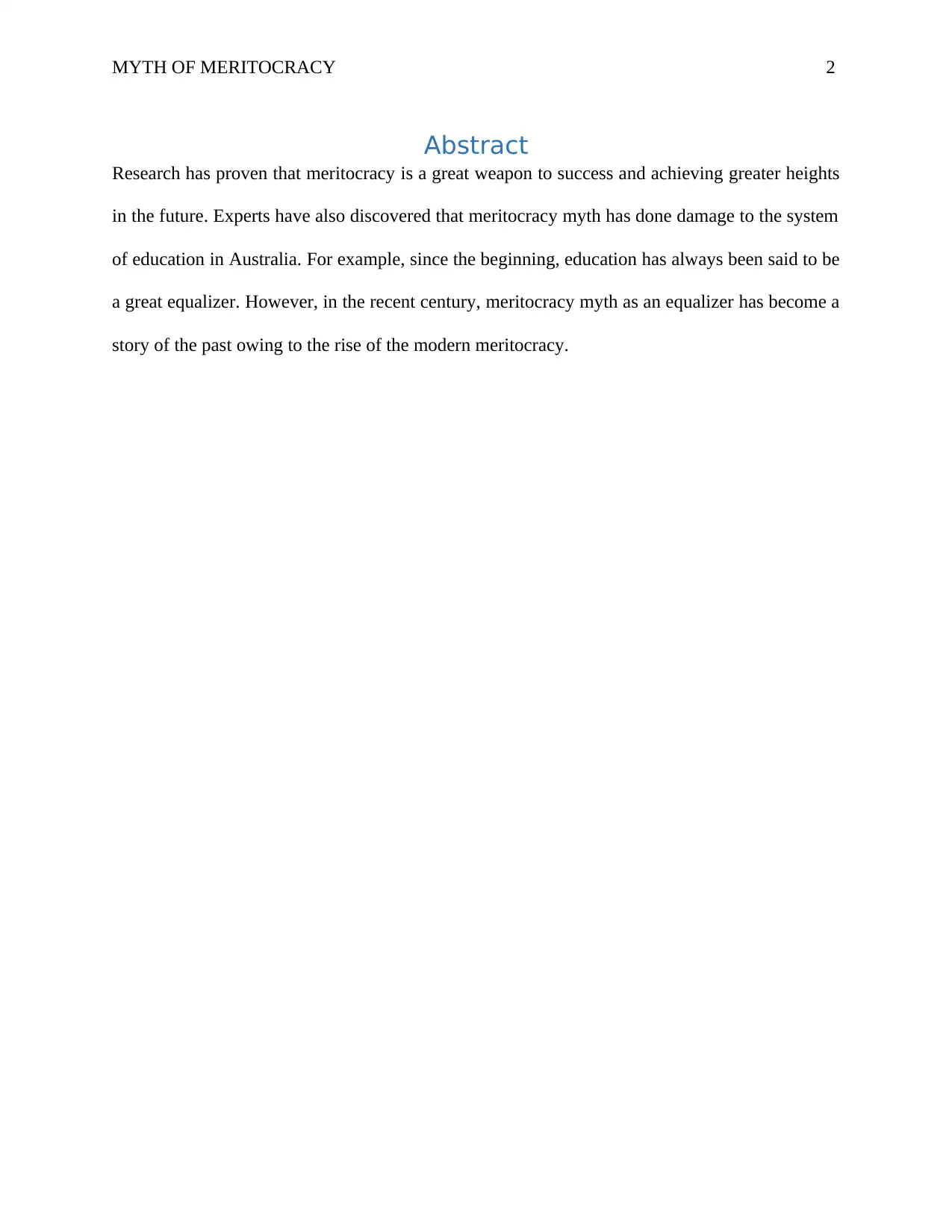
MYTH OF MERITOCRACY 2
Abstract
Research has proven that meritocracy is a great weapon to success and achieving greater heights
in the future. Experts have also discovered that meritocracy myth has done damage to the system
of education in Australia. For example, since the beginning, education has always been said to be
a great equalizer. However, in the recent century, meritocracy myth as an equalizer has become a
story of the past owing to the rise of the modern meritocracy.
Abstract
Research has proven that meritocracy is a great weapon to success and achieving greater heights
in the future. Experts have also discovered that meritocracy myth has done damage to the system
of education in Australia. For example, since the beginning, education has always been said to be
a great equalizer. However, in the recent century, meritocracy myth as an equalizer has become a
story of the past owing to the rise of the modern meritocracy.
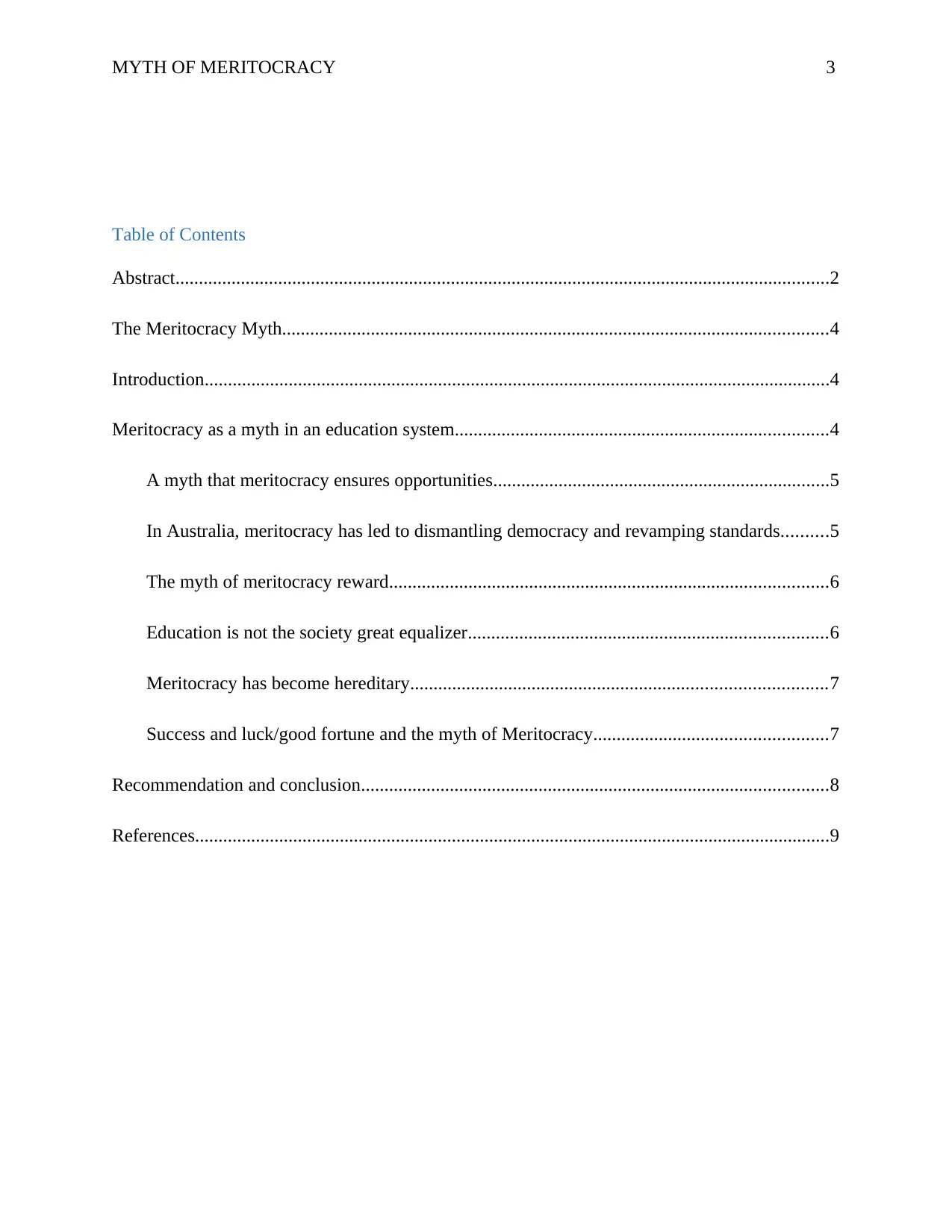
MYTH OF MERITOCRACY 3
Table of Contents
Abstract............................................................................................................................................2
The Meritocracy Myth.....................................................................................................................4
Introduction......................................................................................................................................4
Meritocracy as a myth in an education system................................................................................4
A myth that meritocracy ensures opportunities........................................................................5
In Australia, meritocracy has led to dismantling democracy and revamping standards..........5
The myth of meritocracy reward..............................................................................................6
Education is not the society great equalizer.............................................................................6
Meritocracy has become hereditary.........................................................................................7
Success and luck/good fortune and the myth of Meritocracy..................................................7
Recommendation and conclusion....................................................................................................8
References........................................................................................................................................9
Table of Contents
Abstract............................................................................................................................................2
The Meritocracy Myth.....................................................................................................................4
Introduction......................................................................................................................................4
Meritocracy as a myth in an education system................................................................................4
A myth that meritocracy ensures opportunities........................................................................5
In Australia, meritocracy has led to dismantling democracy and revamping standards..........5
The myth of meritocracy reward..............................................................................................6
Education is not the society great equalizer.............................................................................6
Meritocracy has become hereditary.........................................................................................7
Success and luck/good fortune and the myth of Meritocracy..................................................7
Recommendation and conclusion....................................................................................................8
References........................................................................................................................................9
⊘ This is a preview!⊘
Do you want full access?
Subscribe today to unlock all pages.

Trusted by 1+ million students worldwide
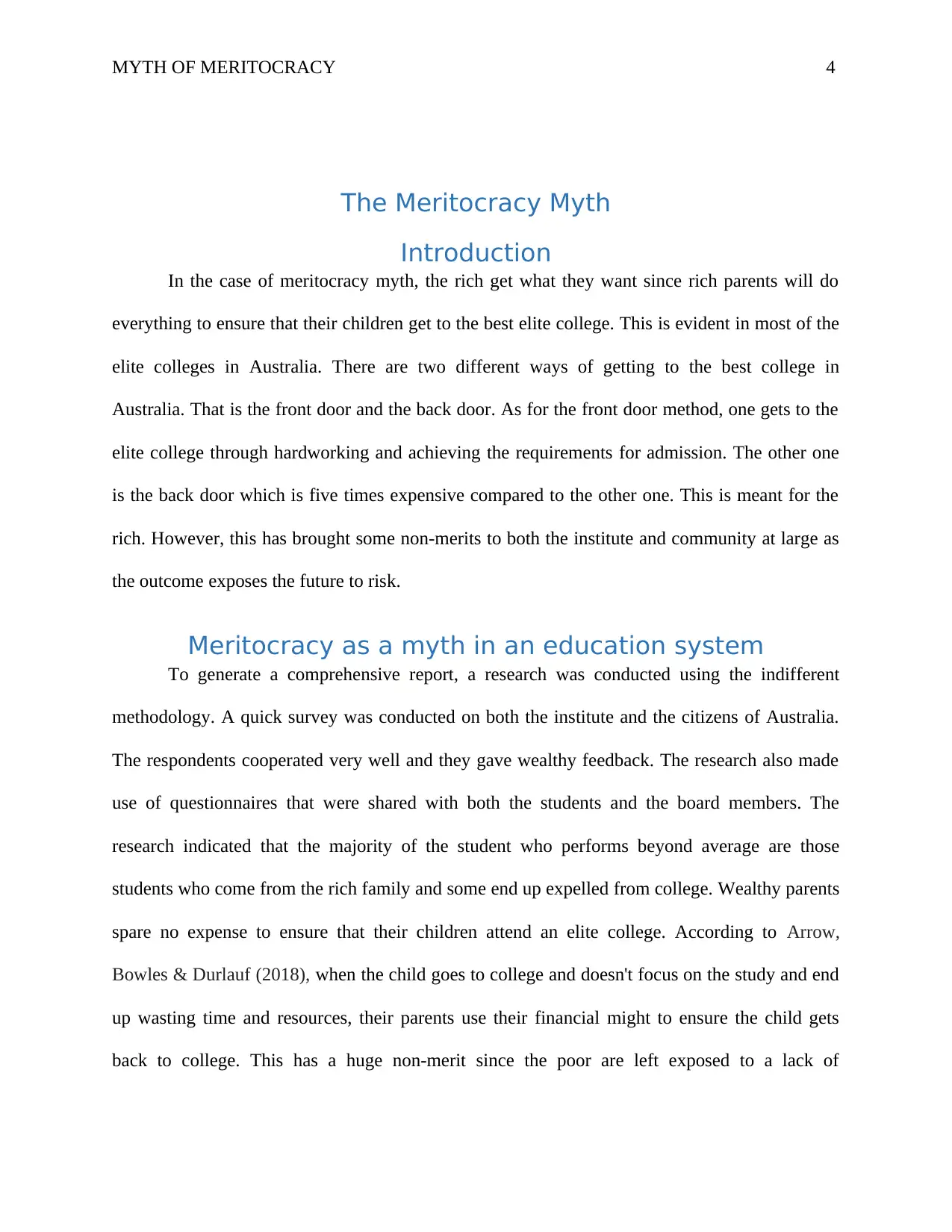
MYTH OF MERITOCRACY 4
The Meritocracy Myth
Introduction
In the case of meritocracy myth, the rich get what they want since rich parents will do
everything to ensure that their children get to the best elite college. This is evident in most of the
elite colleges in Australia. There are two different ways of getting to the best college in
Australia. That is the front door and the back door. As for the front door method, one gets to the
elite college through hardworking and achieving the requirements for admission. The other one
is the back door which is five times expensive compared to the other one. This is meant for the
rich. However, this has brought some non-merits to both the institute and community at large as
the outcome exposes the future to risk.
Meritocracy as a myth in an education system
To generate a comprehensive report, a research was conducted using the indifferent
methodology. A quick survey was conducted on both the institute and the citizens of Australia.
The respondents cooperated very well and they gave wealthy feedback. The research also made
use of questionnaires that were shared with both the students and the board members. The
research indicated that the majority of the student who performs beyond average are those
students who come from the rich family and some end up expelled from college. Wealthy parents
spare no expense to ensure that their children attend an elite college. According to Arrow,
Bowles & Durlauf (2018), when the child goes to college and doesn't focus on the study and end
up wasting time and resources, their parents use their financial might to ensure the child gets
back to college. This has a huge non-merit since the poor are left exposed to a lack of
The Meritocracy Myth
Introduction
In the case of meritocracy myth, the rich get what they want since rich parents will do
everything to ensure that their children get to the best elite college. This is evident in most of the
elite colleges in Australia. There are two different ways of getting to the best college in
Australia. That is the front door and the back door. As for the front door method, one gets to the
elite college through hardworking and achieving the requirements for admission. The other one
is the back door which is five times expensive compared to the other one. This is meant for the
rich. However, this has brought some non-merits to both the institute and community at large as
the outcome exposes the future to risk.
Meritocracy as a myth in an education system
To generate a comprehensive report, a research was conducted using the indifferent
methodology. A quick survey was conducted on both the institute and the citizens of Australia.
The respondents cooperated very well and they gave wealthy feedback. The research also made
use of questionnaires that were shared with both the students and the board members. The
research indicated that the majority of the student who performs beyond average are those
students who come from the rich family and some end up expelled from college. Wealthy parents
spare no expense to ensure that their children attend an elite college. According to Arrow,
Bowles & Durlauf (2018), when the child goes to college and doesn't focus on the study and end
up wasting time and resources, their parents use their financial might to ensure the child gets
back to college. This has a huge non-merit since the poor are left exposed to a lack of
Paraphrase This Document
Need a fresh take? Get an instant paraphrase of this document with our AI Paraphraser
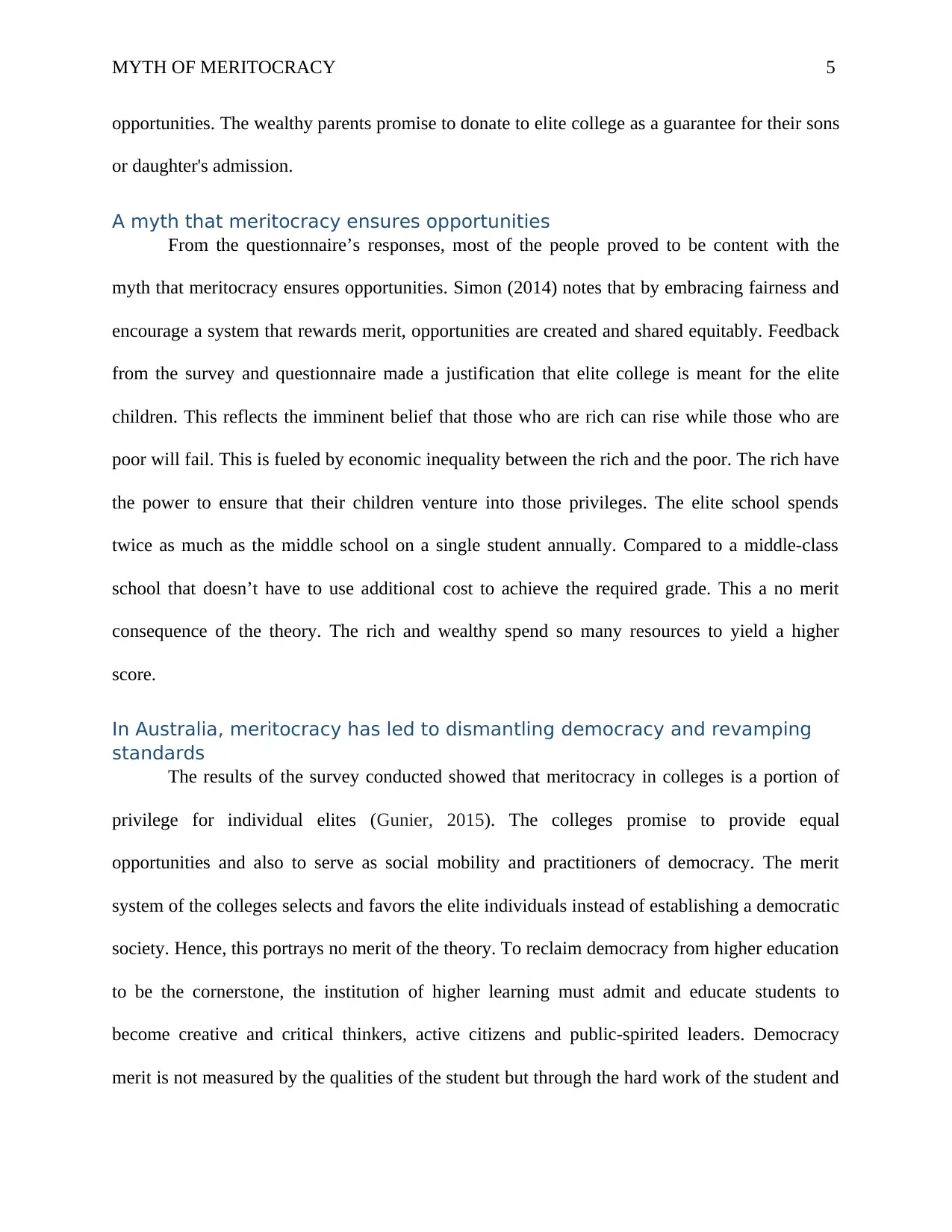
MYTH OF MERITOCRACY 5
opportunities. The wealthy parents promise to donate to elite college as a guarantee for their sons
or daughter's admission.
A myth that meritocracy ensures opportunities
From the questionnaire’s responses, most of the people proved to be content with the
myth that meritocracy ensures opportunities. Simon (2014) notes that by embracing fairness and
encourage a system that rewards merit, opportunities are created and shared equitably. Feedback
from the survey and questionnaire made a justification that elite college is meant for the elite
children. This reflects the imminent belief that those who are rich can rise while those who are
poor will fail. This is fueled by economic inequality between the rich and the poor. The rich have
the power to ensure that their children venture into those privileges. The elite school spends
twice as much as the middle school on a single student annually. Compared to a middle-class
school that doesn’t have to use additional cost to achieve the required grade. This a no merit
consequence of the theory. The rich and wealthy spend so many resources to yield a higher
score.
In Australia, meritocracy has led to dismantling democracy and revamping
standards
The results of the survey conducted showed that meritocracy in colleges is a portion of
privilege for individual elites (Gunier, 2015). The colleges promise to provide equal
opportunities and also to serve as social mobility and practitioners of democracy. The merit
system of the colleges selects and favors the elite individuals instead of establishing a democratic
society. Hence, this portrays no merit of the theory. To reclaim democracy from higher education
to be the cornerstone, the institution of higher learning must admit and educate students to
become creative and critical thinkers, active citizens and public-spirited leaders. Democracy
merit is not measured by the qualities of the student but through the hard work of the student and
opportunities. The wealthy parents promise to donate to elite college as a guarantee for their sons
or daughter's admission.
A myth that meritocracy ensures opportunities
From the questionnaire’s responses, most of the people proved to be content with the
myth that meritocracy ensures opportunities. Simon (2014) notes that by embracing fairness and
encourage a system that rewards merit, opportunities are created and shared equitably. Feedback
from the survey and questionnaire made a justification that elite college is meant for the elite
children. This reflects the imminent belief that those who are rich can rise while those who are
poor will fail. This is fueled by economic inequality between the rich and the poor. The rich have
the power to ensure that their children venture into those privileges. The elite school spends
twice as much as the middle school on a single student annually. Compared to a middle-class
school that doesn’t have to use additional cost to achieve the required grade. This a no merit
consequence of the theory. The rich and wealthy spend so many resources to yield a higher
score.
In Australia, meritocracy has led to dismantling democracy and revamping
standards
The results of the survey conducted showed that meritocracy in colleges is a portion of
privilege for individual elites (Gunier, 2015). The colleges promise to provide equal
opportunities and also to serve as social mobility and practitioners of democracy. The merit
system of the colleges selects and favors the elite individuals instead of establishing a democratic
society. Hence, this portrays no merit of the theory. To reclaim democracy from higher education
to be the cornerstone, the institution of higher learning must admit and educate students to
become creative and critical thinkers, active citizens and public-spirited leaders. Democracy
merit is not measured by the qualities of the student but through the hard work of the student and
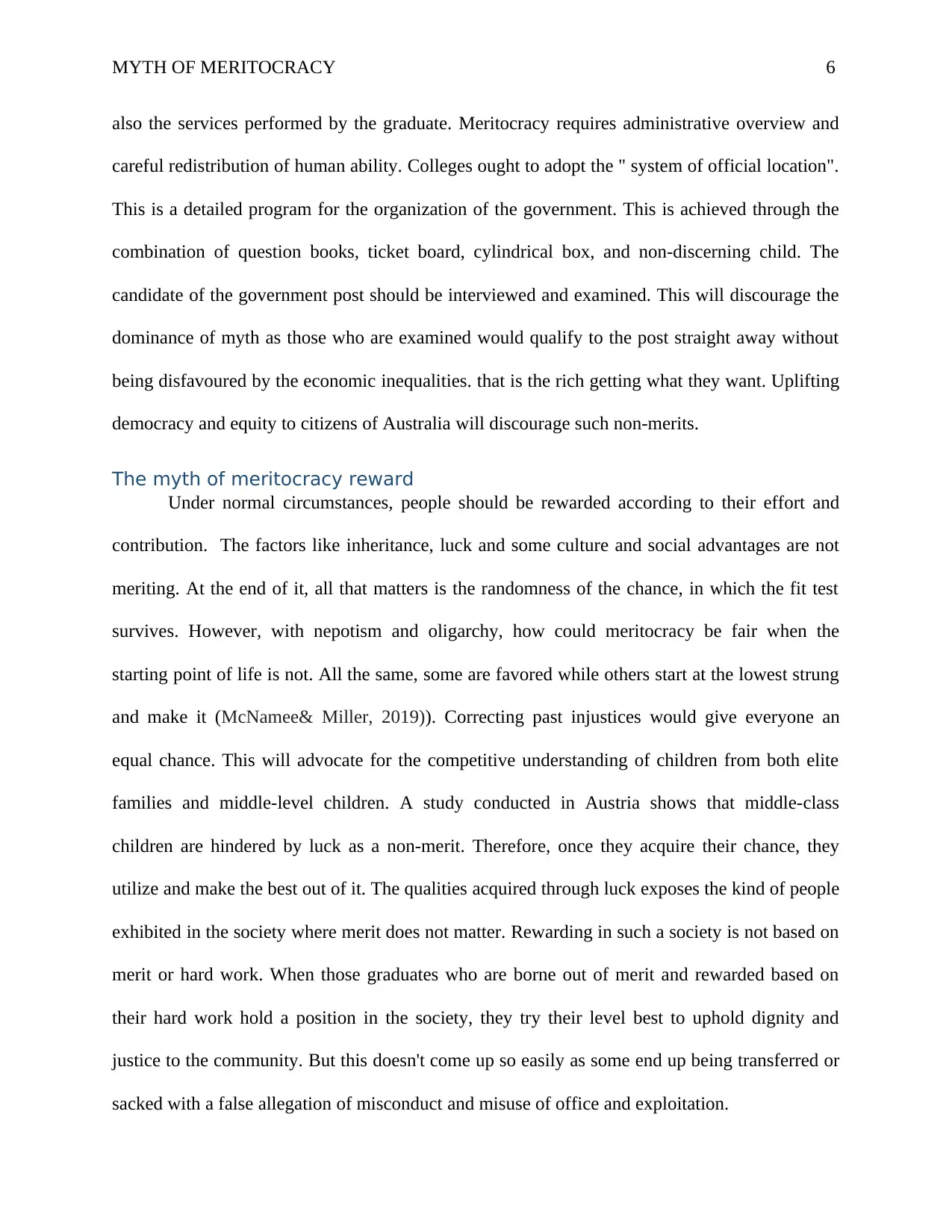
MYTH OF MERITOCRACY 6
also the services performed by the graduate. Meritocracy requires administrative overview and
careful redistribution of human ability. Colleges ought to adopt the " system of official location".
This is a detailed program for the organization of the government. This is achieved through the
combination of question books, ticket board, cylindrical box, and non-discerning child. The
candidate of the government post should be interviewed and examined. This will discourage the
dominance of myth as those who are examined would qualify to the post straight away without
being disfavoured by the economic inequalities. that is the rich getting what they want. Uplifting
democracy and equity to citizens of Australia will discourage such non-merits.
The myth of meritocracy reward
Under normal circumstances, people should be rewarded according to their effort and
contribution. The factors like inheritance, luck and some culture and social advantages are not
meriting. At the end of it, all that matters is the randomness of the chance, in which the fit test
survives. However, with nepotism and oligarchy, how could meritocracy be fair when the
starting point of life is not. All the same, some are favored while others start at the lowest strung
and make it (McNamee& Miller, 2019)). Correcting past injustices would give everyone an
equal chance. This will advocate for the competitive understanding of children from both elite
families and middle-level children. A study conducted in Austria shows that middle-class
children are hindered by luck as a non-merit. Therefore, once they acquire their chance, they
utilize and make the best out of it. The qualities acquired through luck exposes the kind of people
exhibited in the society where merit does not matter. Rewarding in such a society is not based on
merit or hard work. When those graduates who are borne out of merit and rewarded based on
their hard work hold a position in the society, they try their level best to uphold dignity and
justice to the community. But this doesn't come up so easily as some end up being transferred or
sacked with a false allegation of misconduct and misuse of office and exploitation.
also the services performed by the graduate. Meritocracy requires administrative overview and
careful redistribution of human ability. Colleges ought to adopt the " system of official location".
This is a detailed program for the organization of the government. This is achieved through the
combination of question books, ticket board, cylindrical box, and non-discerning child. The
candidate of the government post should be interviewed and examined. This will discourage the
dominance of myth as those who are examined would qualify to the post straight away without
being disfavoured by the economic inequalities. that is the rich getting what they want. Uplifting
democracy and equity to citizens of Australia will discourage such non-merits.
The myth of meritocracy reward
Under normal circumstances, people should be rewarded according to their effort and
contribution. The factors like inheritance, luck and some culture and social advantages are not
meriting. At the end of it, all that matters is the randomness of the chance, in which the fit test
survives. However, with nepotism and oligarchy, how could meritocracy be fair when the
starting point of life is not. All the same, some are favored while others start at the lowest strung
and make it (McNamee& Miller, 2019)). Correcting past injustices would give everyone an
equal chance. This will advocate for the competitive understanding of children from both elite
families and middle-level children. A study conducted in Austria shows that middle-class
children are hindered by luck as a non-merit. Therefore, once they acquire their chance, they
utilize and make the best out of it. The qualities acquired through luck exposes the kind of people
exhibited in the society where merit does not matter. Rewarding in such a society is not based on
merit or hard work. When those graduates who are borne out of merit and rewarded based on
their hard work hold a position in the society, they try their level best to uphold dignity and
justice to the community. But this doesn't come up so easily as some end up being transferred or
sacked with a false allegation of misconduct and misuse of office and exploitation.
⊘ This is a preview!⊘
Do you want full access?
Subscribe today to unlock all pages.

Trusted by 1+ million students worldwide
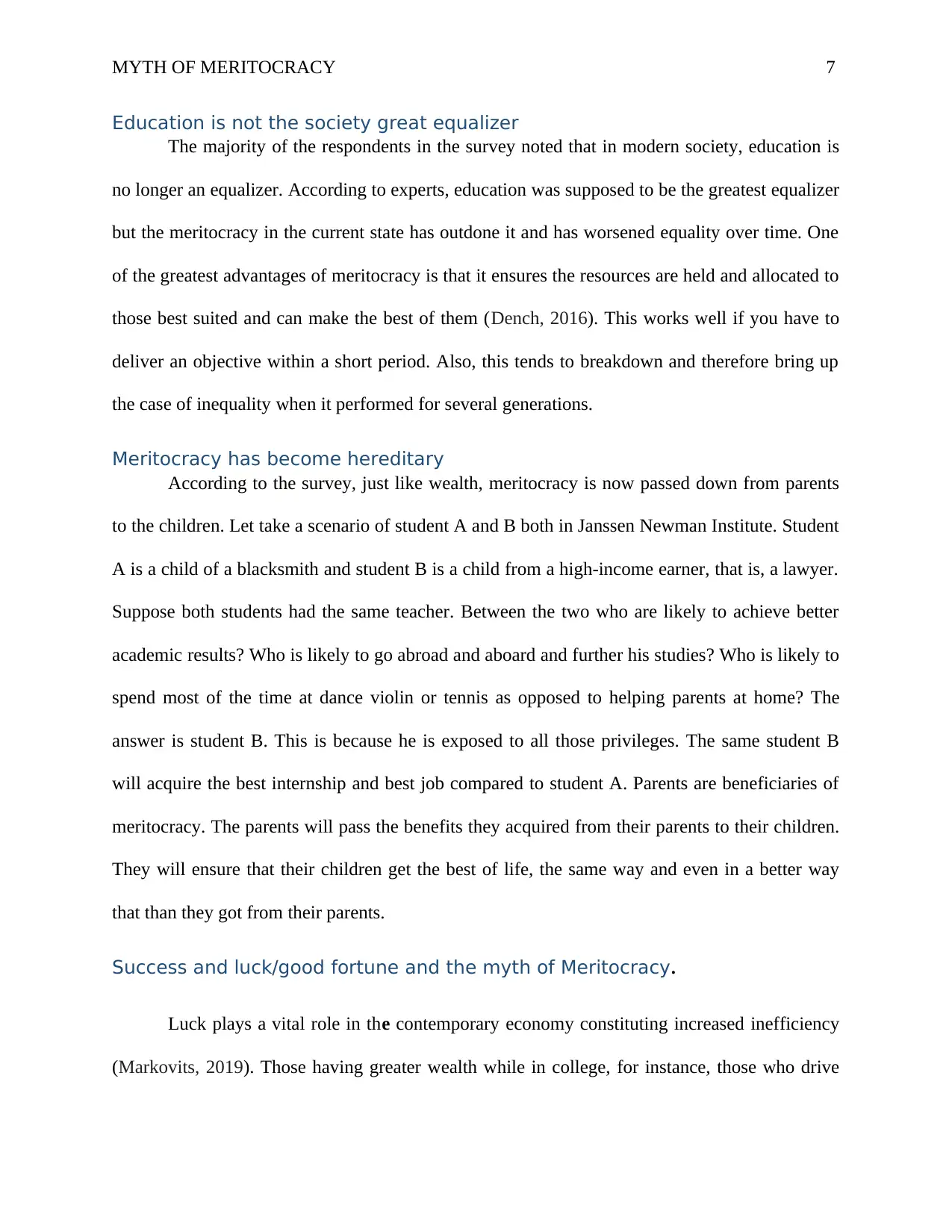
MYTH OF MERITOCRACY 7
Education is not the society great equalizer
The majority of the respondents in the survey noted that in modern society, education is
no longer an equalizer. According to experts, education was supposed to be the greatest equalizer
but the meritocracy in the current state has outdone it and has worsened equality over time. One
of the greatest advantages of meritocracy is that it ensures the resources are held and allocated to
those best suited and can make the best of them (Dench, 2016). This works well if you have to
deliver an objective within a short period. Also, this tends to breakdown and therefore bring up
the case of inequality when it performed for several generations.
Meritocracy has become hereditary
According to the survey, just like wealth, meritocracy is now passed down from parents
to the children. Let take a scenario of student A and B both in Janssen Newman Institute. Student
A is a child of a blacksmith and student B is a child from a high-income earner, that is, a lawyer.
Suppose both students had the same teacher. Between the two who are likely to achieve better
academic results? Who is likely to go abroad and aboard and further his studies? Who is likely to
spend most of the time at dance violin or tennis as opposed to helping parents at home? The
answer is student B. This is because he is exposed to all those privileges. The same student B
will acquire the best internship and best job compared to student A. Parents are beneficiaries of
meritocracy. The parents will pass the benefits they acquired from their parents to their children.
They will ensure that their children get the best of life, the same way and even in a better way
that than they got from their parents.
Success and luck/good fortune and the myth of Meritocracy.
Luck plays a vital role in the contemporary economy constituting increased inefficiency
(Markovits, 2019). Those having greater wealth while in college, for instance, those who drive
Education is not the society great equalizer
The majority of the respondents in the survey noted that in modern society, education is
no longer an equalizer. According to experts, education was supposed to be the greatest equalizer
but the meritocracy in the current state has outdone it and has worsened equality over time. One
of the greatest advantages of meritocracy is that it ensures the resources are held and allocated to
those best suited and can make the best of them (Dench, 2016). This works well if you have to
deliver an objective within a short period. Also, this tends to breakdown and therefore bring up
the case of inequality when it performed for several generations.
Meritocracy has become hereditary
According to the survey, just like wealth, meritocracy is now passed down from parents
to the children. Let take a scenario of student A and B both in Janssen Newman Institute. Student
A is a child of a blacksmith and student B is a child from a high-income earner, that is, a lawyer.
Suppose both students had the same teacher. Between the two who are likely to achieve better
academic results? Who is likely to go abroad and aboard and further his studies? Who is likely to
spend most of the time at dance violin or tennis as opposed to helping parents at home? The
answer is student B. This is because he is exposed to all those privileges. The same student B
will acquire the best internship and best job compared to student A. Parents are beneficiaries of
meritocracy. The parents will pass the benefits they acquired from their parents to their children.
They will ensure that their children get the best of life, the same way and even in a better way
that than they got from their parents.
Success and luck/good fortune and the myth of Meritocracy.
Luck plays a vital role in the contemporary economy constituting increased inefficiency
(Markovits, 2019). Those having greater wealth while in college, for instance, those who drive
Paraphrase This Document
Need a fresh take? Get an instant paraphrase of this document with our AI Paraphraser
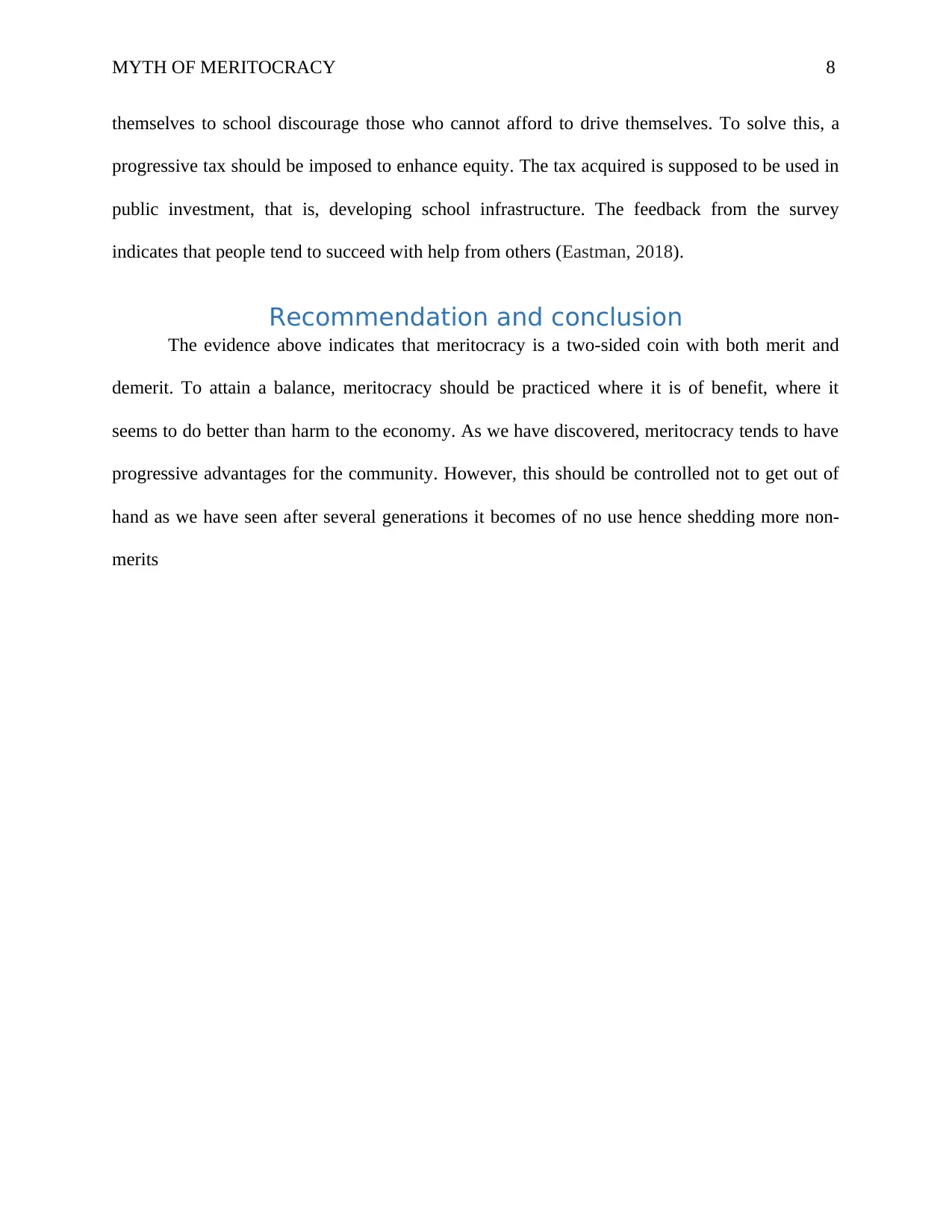
MYTH OF MERITOCRACY 8
themselves to school discourage those who cannot afford to drive themselves. To solve this, a
progressive tax should be imposed to enhance equity. The tax acquired is supposed to be used in
public investment, that is, developing school infrastructure. The feedback from the survey
indicates that people tend to succeed with help from others (Eastman, 2018).
Recommendation and conclusion
The evidence above indicates that meritocracy is a two-sided coin with both merit and
demerit. To attain a balance, meritocracy should be practiced where it is of benefit, where it
seems to do better than harm to the economy. As we have discovered, meritocracy tends to have
progressive advantages for the community. However, this should be controlled not to get out of
hand as we have seen after several generations it becomes of no use hence shedding more non-
merits
themselves to school discourage those who cannot afford to drive themselves. To solve this, a
progressive tax should be imposed to enhance equity. The tax acquired is supposed to be used in
public investment, that is, developing school infrastructure. The feedback from the survey
indicates that people tend to succeed with help from others (Eastman, 2018).
Recommendation and conclusion
The evidence above indicates that meritocracy is a two-sided coin with both merit and
demerit. To attain a balance, meritocracy should be practiced where it is of benefit, where it
seems to do better than harm to the economy. As we have discovered, meritocracy tends to have
progressive advantages for the community. However, this should be controlled not to get out of
hand as we have seen after several generations it becomes of no use hence shedding more non-
merits
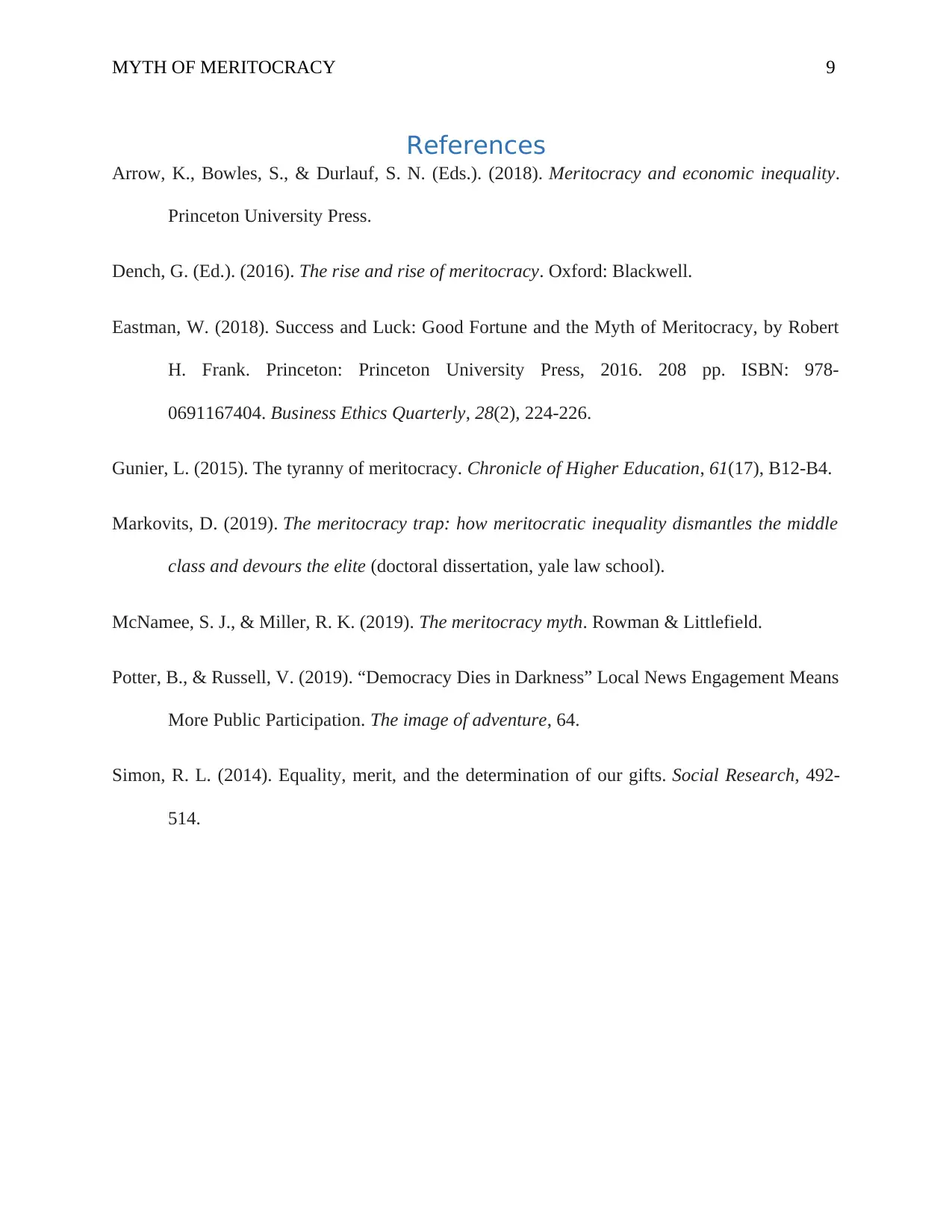
MYTH OF MERITOCRACY 9
References
Arrow, K., Bowles, S., & Durlauf, S. N. (Eds.). (2018). Meritocracy and economic inequality.
Princeton University Press.
Dench, G. (Ed.). (2016). The rise and rise of meritocracy. Oxford: Blackwell.
Eastman, W. (2018). Success and Luck: Good Fortune and the Myth of Meritocracy, by Robert
H. Frank. Princeton: Princeton University Press, 2016. 208 pp. ISBN: 978-
0691167404. Business Ethics Quarterly, 28(2), 224-226.
Gunier, L. (2015). The tyranny of meritocracy. Chronicle of Higher Education, 61(17), B12-B4.
Markovits, D. (2019). The meritocracy trap: how meritocratic inequality dismantles the middle
class and devours the elite (doctoral dissertation, yale law school).
McNamee, S. J., & Miller, R. K. (2019). The meritocracy myth. Rowman & Littlefield.
Potter, B., & Russell, V. (2019). “Democracy Dies in Darkness” Local News Engagement Means
More Public Participation. The image of adventure, 64.
Simon, R. L. (2014). Equality, merit, and the determination of our gifts. Social Research, 492-
514.
References
Arrow, K., Bowles, S., & Durlauf, S. N. (Eds.). (2018). Meritocracy and economic inequality.
Princeton University Press.
Dench, G. (Ed.). (2016). The rise and rise of meritocracy. Oxford: Blackwell.
Eastman, W. (2018). Success and Luck: Good Fortune and the Myth of Meritocracy, by Robert
H. Frank. Princeton: Princeton University Press, 2016. 208 pp. ISBN: 978-
0691167404. Business Ethics Quarterly, 28(2), 224-226.
Gunier, L. (2015). The tyranny of meritocracy. Chronicle of Higher Education, 61(17), B12-B4.
Markovits, D. (2019). The meritocracy trap: how meritocratic inequality dismantles the middle
class and devours the elite (doctoral dissertation, yale law school).
McNamee, S. J., & Miller, R. K. (2019). The meritocracy myth. Rowman & Littlefield.
Potter, B., & Russell, V. (2019). “Democracy Dies in Darkness” Local News Engagement Means
More Public Participation. The image of adventure, 64.
Simon, R. L. (2014). Equality, merit, and the determination of our gifts. Social Research, 492-
514.
⊘ This is a preview!⊘
Do you want full access?
Subscribe today to unlock all pages.

Trusted by 1+ million students worldwide
1 out of 9
Your All-in-One AI-Powered Toolkit for Academic Success.
+13062052269
info@desklib.com
Available 24*7 on WhatsApp / Email
![[object Object]](/_next/static/media/star-bottom.7253800d.svg)
Unlock your academic potential
Copyright © 2020–2025 A2Z Services. All Rights Reserved. Developed and managed by ZUCOL.